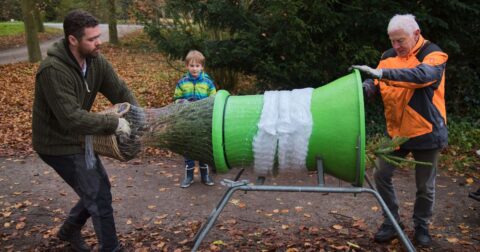Investigation
What Does a Small Town Do When the Water Is Undrinkable?
Climate•8 min read
Explainer
From plant-based eggnog to recycled wrapping paper, here are some ways to curb your environmental impact.


Words by Jessica Scott-Reid
December is the season of giving for many — a time for joy and cheer, gifts and goodwill. But for those hoping to limit their environmental impact, this time of year can feel overwhelming. Consumerism and overconsumption can fuel waste and excess each holiday season, making the acts of both giving and receiving feel fraught with anxiety.
One person can’t solve the climate crisis, but research from Project Drawdown shows household actions can add up to make a big difference. There are ways to celebrate traditions while doing your best to limit your climate impact and take it easy on the planet.
1. Opt for eco-friendlier trees.
A Christmas tree farm may be a fun setting for a holiday photoshoot or a Taylor Swift song, but as is the case for most forms of agriculture, Christmas tree farms come with environmental tradeoffs. Overuse or misuse of pesticides and fertilizers on farms can leach into soil and water, threatening local ecosystems and polluting the water. Look for farms that follow integrated pest management practices.
How you dispose of your tree matters too: recycle your tree at the end of the season to turn it into mulch or consider instead an artificial tree, which you can re-use for years to come. Or you might buy a potted tree that can be replanted outside after the holidays.
2. Limit single use wrapping.
While paper products aren’t as polluting as plastic or food waste, most wrapping paper is not recyclable, and ends up in landfill after a few minutes of use. Local recycling rules vary, but often the problem is metallic components, added wax-coated shine and dyes, as well as tissue, according to Zero Waste DC. To cut back on the piles of garbage filling up the bin after all the gift-giving this holiday season, opt for recyclable materials such as newspapers or specifically recyclable wrapping paper. Even better, go for reusable materials like gift bags and cloth wrapping that can be used over and over as a yearly tradition.
3. Gift mindfully.
Plastic is ubiquitous in consumer products. Enduringly durable and flexible, plastics can take thousands of years to break down in landfill, if they don’t end up in waterways and other ecosystems first.
Try thrifting some toys, décor and household items this holiday season, as well as refurbished electronics. You can also opt for wooden toys and other low-impact items, or even local experiences.
4. Put more plants on your holiday menu.
Food is a significant contributor to climate change, responsible for over a third of all greenhouse gas emissions. Most of those food-related emissions come from meat, especially beef and, to a lesser extent, dairy. Cutting back on beef and dairy, and swapping in more plant-based alternatives will help reduce your climate impact.
5. Forgo the New Year’s Eve fireworks.
Fireworks can be festive and fun, but they also come with environmental downsides. Especially colorful fireworks sometimes contain heavy metals (such as lead, copper and barium), increasing air pollution in the short-term, which could exacerbate some health conditions. They also litter the ground with plastic.
The noise pollution caused by fireworks can also terrify animals, including companion animals, wildlife, zoo animals and farm animals. Nearly every holiday season, fireworks lead to instances of animals being injured or killed trying to flee the loud noise.
6. Plan ahead to reduce food waste.
When preparing your holiday feast, try to plan your menu with an eye towards reducing food waste. A staggering one-third of global food production is wasted annually — around 1.3 billion metric tons — with nearly 570 million metric tons of food waste tossed out in our own homes. We can help combat food waste by packing leftovers for guests, and exploring creative ways to repurpose remaining ingredients. Composting scraps also reduces your environmental impact, or keep a veggie scrap sac in the freezer to collect ends, stems and peels for nutrient-dense soup stock.
7. Don’t forget the clean-up.
The holiday aftermath can leave behind a major mess. During cleanup, assess your needs for the upcoming year, keep whatever can can be reused and repurposed. As for the rest, donate any surplus decor that you’re not likely to use next season and take care that all that can be recycled is put in its proper bin.
The holidays can be an overwhelming time for anyone who worries about their impact on the planet. But they don’t have to be. Taking the steps you can will help you enjoy the festive season in a more sustainable way.